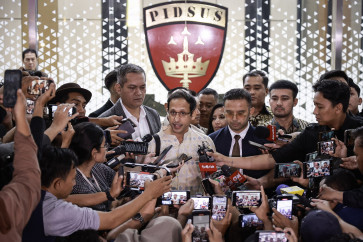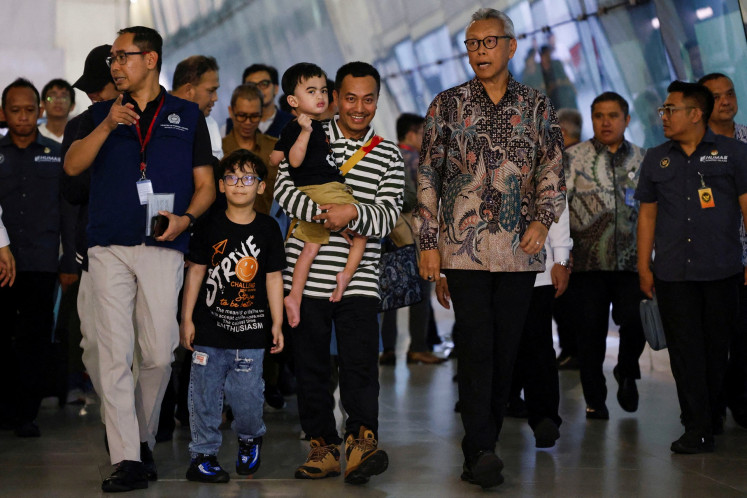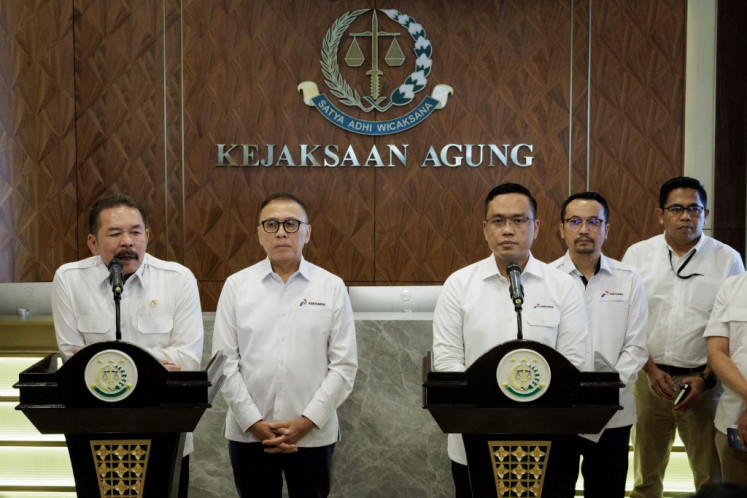Popular Reads
Top Results
Can't find what you're looking for?
View all search resultsPopular Reads
Top Results
Can't find what you're looking for?
View all search resultsDompet Dhuafa takes lead in Indonesian philanthropy
In the month of its 23rd anniversary, Jakarta-based Muslim philanthropic organization Dompet Dhuafa received international recognition over its progressive concepts and programs in its goal to alleviate poverty in the country
Change text size
Gift Premium Articles
to Anyone

I
n the month of its 23rd anniversary, Jakarta-based Muslim philanthropic organization Dompet Dhuafa received international recognition over its progressive concepts and programs in its goal to alleviate poverty in the country.
It was awarded with the prestigious Ramon Magsaysay Award, announced on July 27, a prize given by trustees of the Rockefeller Brothers Fund for Asian individuals or organizations with excellent achievement in varied fields.
Dompet Dhuafa, which means wallet for the poor, started as the social wing of journalists at the Republika daily who collected 2.5 percent of their zakat (a tax paid in accordance with Islamic teachings) since July 1, 1993 to be handed to the poor they met during assignment.
A year afterwards it transformed into a foundation under the daily and as it developed into a well-organized body in 2001, Dompet Dhuafa was made into a zakat management institution at the national level.
Not only does it have branches in Indonesia’s big cities, but they are also in Hong Kong, Japan, South Korea, Australia and the US, which made Dompet Dhuafa eligible for the title of an international humanitarian organization.
The organization was among the international non-profit organizations appointed to be a consultative member with the United Nation’s Economic and Social Council (Ecosoc).
It actively collects funds through alms, endowments and other lawful and legal means from individuals, groups and companies and channels them to people in need and victims of natural disasters at home and in foreign countries.
Last year, Dompet Dhuafa collected a total of US$20 million in donations. It has reached 13 million beneficiaries as of 2015 and more than 20 percent of them have been lifted out of poverty — an achievement recognized by the awards organizer.
“We are grateful for this international acknowledgement and humbled by the fact that what we have done for the people is being considered great,” said Ahmad Juwaini, president of Dompet Dhuafa Filantropi, as reported by Antara News. “We will take the award as a metaphorical whip to always do our best.”
“We redefine zakat by underlining its social function. It is no longer a person-to-person one-time donation. Zakat is a sustainable fund and should be managed well,” he said.
The award is to be conferred on Aug. 31 in Manila.
Among the organization’s highlight programs were ones on people is empowerment, education and health. It provided technical and financial support to groups of farmers and fishermen and guided the development of industrial centers.
It manages a free school, SMART Ekselensia Indonesia, and a free hospital, Rumah Sehat Terpadu, in Bogor, West Java. Dompet Dhuafa also channeled donations to provide scholarships and held regular free health checks in public places.
“Dompet Dhuafa is known for their programs that help out the needy until they can help themselves. From beneficiaries they become donors,” said Ninik Annisa, a researcher with the Public Interest Research and Advocacy Center (PIRAC).
While Dompet Dhuafa was dubbed one of the largest philanthropic organizations in Indonesia in terms of donations received, what has largely contributed to its achievement was the fast growth of high net-worth individuals (HNWI) in Indonesia — the fastest growth in Asia according to a report by Wealth Insight.
The study shows that the super-rich population grew by 67 percent between 2007 and 2011 with a combined wealth of up to $241 billion. Many of the members of this population established family charity funds channeled through philanthropic organizations.
Indonesia is among the top 10 countries where people are highly enthusiastic about giving to charity, according the CAF World Giving Index Report released in 2014. The report says 66 percent, 117 million, of Indonesians allocate money from their budgets for charity purposes.
Research jointly conducted by PIRAC and Dompet Dhuafa last year showed that private companies contributed Rp 12.45 trillion in total in 2014 to charity, while Muslim philanthropic organizations also recorded an increase in zakat received every year — Rp 3.2 trillion in 2014 compared to Rp 1.73 trillion in 2012. However, the combined zakat donations received by philanthropic organizations only reached 10 percent of its potential Rp 217 trillion every year.
Ninik said philanthropic organizations had changed the way they managed funds so that zakat could also be used for social development programs.
“Dompet Dhuafa is at the forefront by allowing non-Muslim donors to participate and by the inclusion of non-Muslims as beneficiaries.
“A modern organization in one side will benefit the donors because they could get reports on the usage of funds, while on the other side its transparency and reliability will gain public legitimacy over its existence.”
In his written opinion published by Republika on July 1, Ahmad Juwaini acknowledged the need for a modern, professional organization for Dompet Dhuafa to undergo its mission.
“The first mission since its establishment, which remains the main mission of Dompet Dhuafa, is to work for the people, by serving and empowering them. Public interest should be our top priority.’’









